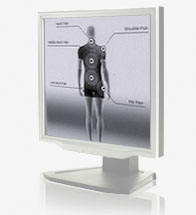Is your sleep healthy?
Just because your eyes are closed and you experience long stretches of unconsciousness doesn't mean you're getting the right kind of sleep. Not all sleep is created equal.
To find out if you're experiencing deep, nourishing, restorative sleep, click on the statement that best describes your sleep.
I get eight hours of sleep every night, but I still feel tired every day.
If the sleep you do get isn't quality sleep, it doesn't matter how much you get. Just like your body can't live on junk food, it also needs more than junk sleep. Ideally, you should be getting "nourishment" out of every hour you're sleeping. You do that by creating a sleep environment that promotes healthy sleep, engaging in positive pre-sleep behaviors and sleeping on a bed and pillow that supports your skeletal muscular system and maintains proper body alignment.
It may be easier to fix than you think. Sometimes it's just a matter of practicing healthy sleep habits or making changes to your sleep environment. Take a look at factors like:
- Consistency of bedtime and wake time
- If/when you exercise
- Diet (what you eat as well as when you eat it)
- Room temperature
- Household sleep disruptions such as noise, TVs, etc.
- Your bed and pillow
Making modifications to any or all of the above will contribute to more nourishing sleep.
I usually lie awake for an hour or more before I fall asleep.
Bedtime should be when you let go of the day's cares and worries, not mull them over. Try to set aside time for problem solving earlier in the day so you can leave those anxious thoughts behind. Consider writing them down in a "worry book" well before bedtime. Take part in relaxing activities that promote sleep, like deep breathing, yoga, taking a warm bath or reading. And definitely don't exercise within 3-4 hours of bedtime or watch TV. Your sleeplessness could be influenced by your sleep environment (too warm, too bright, etc.). Or you've engaged in a pre-sleep behavior that is working against you (long nap, spicy dinner, etc.).
I don't have a problem with sleep. I'm asleep as soon as I hit the pillow.
While this might sound like a good thing, ironically it's a sign that you're sleep deprived. The average time from when your head hits the pillow to when you fall asleep should be 15-20 minutes. If it's less than that, your body is telling you to get more sleep or higher-quality sleep. Once you start getting more healthy, restorative sleep, you'll find yourself waking up refreshed and ready to take on the day.
I don't need much sleep. Four to five hours and I'm good to go.
While you may think you're doing just fine, in the long run, your body's paying a price. Sleep experts agree - adults need 7-9 hours a night to function well the next day. When you don't get enough, you could begin to suffer from short-term immunity and long-term health issues. These can include increased susceptibility to cold and flu, disease, obesity, high blood pressure, negative mood and behavior, decreased productivity, and fatigue-related safety issues at home, at work and while driving. When you begin to look at sleep as being as essential to your health as proper diet and exercise, you should begin to see a change in your health for the better.
While sleep patterns change with age, the amount of sleep you need generally does not. Adults should get between 7-9 hours a night. Older people may wake up more frequently through the night, meaning they get less nighttime sleep, but the sleep need is no less than that for younger adults. You may just need to reallocate when you get your sleep. Incorporating a nap as part of the daily routine promotes wakefulness and peak performance.
I toss and turn a lot, waking up throughout the night. I never get comfortable.
Sleep should be one of the most comfortable things you do all day. If you wake up with discomfort or pain, that's a sure sign something needs to change. Your body should be getting proper pressure relief and alignment when you sleep. Otherwise, you will not be getting deep, nourishing, restorative sleep. Until you see a better bed and pillow as a necessity rather than a luxury, your sleep will be compromised. And so, too, your health and well-being.








